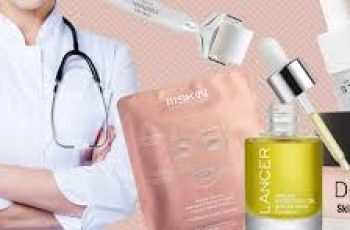
Anti-Aging Skincare Products You Should Have in Your Routine, According to Dermatologists
Aging is a natural process, and your skin is often where the first signs show. Fine lines, dryness, dark spots, and sagging are common as the years go by.
These changes happen because your skin gradually loses collagen and elasticity. Environmental factors like sun exposure and pollution can make this worse.
Habits such as smoking, lack of sleep, and poor nutrition also accelerate skin aging. But the right skincare routine can help protect your skin over time.
We spoke with top dermatologists about the most effective anti-aging skincare products. These are the products they say you should include in your routine.
1. Sunscreen: Your First Line of Defense
The number one product for anti-aging, according to every dermatologist? Sunscreen. It shields your skin from ultraviolet (UV) radiation, a leading cause of premature aging.
Even if it’s cloudy or you’re indoors, sunscreen is essential. UV rays penetrate clouds and windows, affecting your skin even when you’re not at the beach.
Regular use of sunscreen helps prevent:
Fine lines and wrinkles
Age spots and freckles
Leathery skin texture
Uneven pigmentation
Skin cancer
“Sun damage is one of the biggest causes of premature aging,” says Dr. Thomas Griffin, a dermatologist in Pennsylvania.
He explains that UV light breaks down collagen and elastin in the skin. These proteins keep your skin smooth, firm, and youthful.
What to Look For in Sunscreen:
When choosing a sunscreen, prioritize these features:
Broad-spectrum protection (against both UVA and UVB rays)
SPF 30 or higher
Water resistance
Mineral sunscreens with zinc oxide or titanium dioxide are great choices. These act like a mirror, reflecting UV rays off the skin.
They’re also less irritating than chemical sunscreens, especially for sensitive or acne-prone skin.
2. Retinoids: Backed by 50+ Years of Research
Retinoids are vitamin A derivatives, and they are widely recognized for their anti-aging power. They boost skin cell turnover and stimulate collagen production.
“Retinoids are among the most effective ingredients to slow skin aging,” says Dr. Elaine Kung, a dermatologist in New York City.
Retinoids help:
Strengthen your skin barrier
Improve hydration levels
Boost collagen production
Reduce wrinkles and fine lines
Fade dark spots and uneven tone
Retinoids come in different forms. These include prescription treatments like tretinoin and over-the-counter options like retinol.
What to Look For in Retinoids:
Check the label for these vitamin A derivatives:
Retinol
Retinyl palmitate
Retinaldehyde
Retinyl acetate
Adapalene
Start slow to avoid irritation, also known as “retinol burn.” This may cause redness, flaking, or dryness in the beginning.
Dr. Kung recommends using a pea-sized amount once or twice a week. Gradually increase use as your skin adjusts.
If your skin becomes too irritated, reduce how often you use it. Some beginners apply it for 15–30 minutes, then rinse it off.
3. Vitamin C: Brighten and Defend
Vitamin C is a powerful antioxidant that protects your skin from environmental stress. It helps neutralize free radicals caused by sun and pollution.
Free radicals damage skin cells and break down collagen. Over time, this leads to sagging, dullness, and uneven skin tone.
“Vitamin C helps fight UV damage and brightens the skin,” explains Dr. Griffin. It can also improve the appearance of dark spots and melasma.
It works by blocking tyrosinase, an enzyme involved in pigment production.
What to Look For in Vitamin C Products:
Vitamin C is often listed as:
Ascorbic acid
Ascorbyl palmitate
Magnesium ascorbyl phosphate
Ascorbyl glucoside
Dr. Kung recommends looking for a concentration of 8–20%. Higher percentages offer more impact, but can cause irritation if your skin is sensitive.
For best results, choose products in opaque or airtight packaging. Vitamin C breaks down when exposed to light or air, making it less effective.
Start with a 10% formula and increase as your skin builds tolerance.
4. Hyaluronic Acid: Intense Hydration
As you age, your skin produces less hyaluronic acid, which leads to dryness and loss of elasticity. Adding it back can help your skin look plumper and smoother.
“Hyaluronic acid can hold 1,000 times its weight in water,” says Dr. Jake Woods, a dermatologist at Gya Labs.
This powerful humectant attracts moisture into the skin. It’s excellent for all skin types and particularly beneficial in dry climates or colder months.
What to Look For in Hyaluronic Acid Products:
Look for terms like:
Hyaluronic acid
Sodium hyaluronate
Dr. Woods recommends products with multiple molecular weights. This helps deliver moisture to both surface and deeper layers of the skin.
Low molecular weight = deeper penetration
High molecular weight = surface hydration
Layer hyaluronic acid under a moisturizer to lock in hydration. Use it on damp skin for the best results.
5. Peptides: Boost Skin Structure
Peptides are short chains of amino acids that help build proteins in the skin, like collagen and elastin.
“As we age, collagen production slows down,” says Dr. Woods. “Peptides signal your skin to produce more.”
This results in firmer, more elastic skin and fewer wrinkles. Peptides also help repair skin damage and support the skin barrier.
What to Look For in Peptide Products:
Look for ingredients like:
Palmitoyl pentapeptide-4
Copper peptides
Acetyl hexapeptide
Matrixyl 3000
Dr. Woods advises checking how high peptides are listed in the ingredient list. A higher position usually means a higher concentration.
Products with multiple types of peptides may offer better overall benefits for aging skin.
6. Niacinamide: Gentle and Effective
Niacinamide, also known as vitamin B3, is a multitasking ingredient that’s great for aging skin. It has anti-inflammatory and antioxidant properties.
It helps with hydration, strengthens the skin barrier, and reduces discoloration. It also works for those with acne, rosacea, or sensitive skin.
“Niacinamide increases ceramide production, which helps the skin retain moisture,” says Dr. Woods.
It can also minimize pores, reduce redness, and improve overall skin texture over time.
What to Look For in Niacinamide Products:
Niacinamide is sometimes listed simply as vitamin B3 on the label.
Dr. Woods suggests choosing products with 2–5% niacinamide for best results. This concentration is both effective and gentle.
You can find it in serums, moisturizers, and even cleansers. It’s often combined with other active ingredients like hyaluronic acid or vitamin C.
Quick Review: The Anti-Aging Essentials
A well-rounded anti-aging routine includes these six core ingredients:
Sunscreen – for daily UV protection and cancer prevention
Retinoids – to boost collagen and fade fine lines
Vitamin C – to brighten skin and fight free radicals
Hyaluronic Acid – to deeply hydrate and plump
Peptides – to improve skin firmness and repair damage
Niacinamide – to calm, hydrate, and even skin tone
Each product plays a unique role in supporting your skin’s health and appearance.
Talk to Your Dermatologist
Everyone’s skin is different, and what works for one person might not work for another. A dermatologist can help you find the right products.
Some ingredients may cause irritation or allergic reactions, especially if you have conditions like eczema or rosacea.
Patch test new products and introduce them slowly. Gradual change is more effective—and gentler—than overwhelming your skin with too much at once.
Final Thoughts
Aging is natural, but taking care of your skin can help you age gracefully. With the right products and consistency, you can protect your skin and keep it glowing.
Focus on hydration, sun protection, and ingredients that support collagen. Stay patient—visible results take time, but your skin will thank you later.


